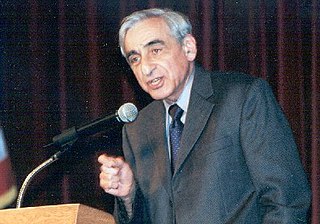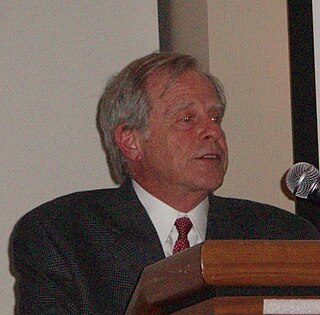Related Research Articles

Allan David Bloom was an American philosopher, classicist, and academician. He studied under David Grene, Leo Strauss, Richard McKeon, and Alexandre Kojève. He subsequently taught at Cornell University, the University of Toronto, Tel Aviv University, Yale University, the École normale supérieure, and the University of Chicago.

Michael Laban Walzer is an American political theorist and public intellectual. A professor emeritus at the Institute for Advanced Study (IAS) in Princeton, New Jersey, he is editor emeritus of the left-wing magazine Dissent, which he has been affiliated with since his years as an undergraduate at Brandeis University, an advisory editor of the Jewish journal Fathom, and sits on the editorial board of the Jewish Review of Books.

Robert Kagan is an American historian. He is a neoconservative scholar. He is a critic of U.S. foreign policy and a leading advocate of liberal internationalism.
Michael W. Doyle is an American international relations scholar who is a theorist of the liberal "democratic peace" and author of Liberalism and World Politics. He has also written on the comparative history of empires and the evaluation of UN peace-keeping. He is a University professor of International Affairs, Law and Political Science at Columbia University - School of International and Public Affairs. He is the former director of Columbia Global Policy Initiative. He co-directs the Center on Global Governance at Columbia Law School.

Peter Alexander Beinart is an American liberal columnist, journalist, and political commentator. A former editor of The New Republic, he has also written for Time, The Atlantic, and The New York Review of Books, among other periodicals. He has written four books.

Jonathan Chait is an American pundit and writer for New York magazine. He was previously a senior editor at The New Republic and an assistant editor of The American Prospect. He writes a periodic column in the Los Angeles Times.

Alfred Whitney Griswold was an American historian and educator. He served as 16th president of Yale University from 1951 to 1963, during which he built much of Yale's modern scientific research infrastructure, especially on Science Hill.

Michael Lind is an American writer and academic. He has explained and defended the tradition of American democratic nationalism in a number of books, beginning with The Next American Nation: The New Nationalism and the Fourth American Revolution (1995). He is currently a professor at the Lyndon B. Johnson School of Public Affairs at the University of Texas at Austin.
Paul Lawrence Berman is an American writer on politics and literature.
Dwight Macdonald was an American writer, critic, philosopher, and activist. Macdonald was a member of the New York Intellectuals and editor of their leftist magazine Partisan Review for six years. He also contributed to other New York publications including Time, The New Yorker, The New York Review of Books, and Politics, a journal which he founded in 1944.

Theodore J. "Ted" Lowi was an American political scientist. He was the John L. Senior Professor of American Institutions teaching in the Government Department at Cornell University. His area of research was the American government and public policy. He was a member of the core faculty of the Cornell Institute for Public Affairs.
Modern liberalism is the dominant version of liberalism in the United States. It combines ideas of civil liberty and equality with support for social justice and a mixed economy.
David Bromwich is Sterling Professor of English at Yale University.
Fred Siegel was an American historian and conservative writer who was a senior fellow at the Manhattan Institute for Policy Research, a conservative think tank which focuses on urban policy and politics. He served as a professor of history and the humanities at Cooper Union and was a contributor to numerous publications, including The New York Post, The New Republic, The Atlantic Monthly, Commonweal, Tikkun, and Telos.
Liberalism in the United States is based on concepts of unalienable rights of the individual. The fundamental liberal ideals of consent of the governed, freedom of speech, freedom of the press, freedom of religion, the separation of church and state, the right to bear arms, the right to due process, and equality before the law are widely accepted as a common foundation of liberalism. It differs from liberalism worldwide because the United States has never had a resident hereditary aristocracy, and avoided much of the class warfare that characterized Europe. According to American philosopher Ian Adams, "all US parties are liberal and always have been. Essentially they espouse classical liberalism, that is a form of democratized Whig constitutionalism plus the free market. The point of difference comes with the influence of social liberalism" and principled disagreements about the proper role of government.

Ira I. Katznelson is an American political scientist and historian, noted for his research on the liberal state, inequality, social knowledge, and institutions, primarily focused on the United States. His work has been characterized as an "interrogation of political liberalism in the United States and Europe—asking for definition of its many forms, their origins, their strengths and weaknesses, and what kinds there can be".
Samuel Aaron Moyn is the Chancellor Kent Professor of Law and History at Yale University, previously the Henry R. Luce Professor of Jurisprudence at Yale Law School and Professor of History at Yale University, which he joined in July 2017. Previously, he was a professor of history at Columbia University for thirteen years and a professor of history and of law at Harvard University for three years. His research interests are in modern European intellectual history, with special interests in France and Germany, political and legal thought, historical and critical theory, and Jewish studies.
Adolph Leonard Reed Jr. is an American professor emeritus of political science at the University of Pennsylvania, specializing in studies of issues of racism and U.S. politics.
Liberalism is a political and moral philosophy based on the rights of the individual, liberty, consent of the governed, political equality, right to private property and equality before the law. Liberals espouse various and often mutually warring views depending on their understanding of these principles but generally support private property, market economies, individual rights, liberal democracy, secularism, rule of law, economic and political freedom, freedom of speech, freedom of the press, freedom of assembly, and freedom of religion. Liberalism is frequently cited as the dominant ideology of modern history.
Edmund Fawcett is a British political journalist and author.
References
- ↑ "James Sleeper | Department of Political Science". politicalscience.yale.edu.
- ↑ "Looking For America". jimsleeper.com. 2011-06-30. Archived from the original on 2013-10-21. Retrieved 2013-10-21.
- ↑ "False Comforts" (PDF). Jimsleeper.com. Retrieved 2013-10-21.
- ↑ Peters, Justin (2011-05-20). "Read Jim Sleeper's Essay on Ressentiment : Columbia Journalism Review". Cjr.org. Retrieved 2013-10-21.
- ↑ "With Friends Like These... Who Will Defend Liberal Education ?" (PDF). Jimsleeper.com. Retrieved 2013-10-21.
- ↑ Sleeper, Jim (1991-09-17). Closest of Strangers: Liberalism and the Politics of Race in New York: Jim Sleeper: 9780393307993: Amazon.com: Books. W. W. Norton & Company. ISBN 0393307999.
- ↑ Sleeper, Jim (2002). Liberal Racism: How Fixating on Race Subverts the American Dream: Jim Sleeper: 9780742522015: Amazon.com: Books. Rowman & Littlefield. ISBN 0742522016.
- ↑ "racial roots of the LIRR massacre" (PDF). Jimsleeper.com. Retrieved 2013-10-21.
- ↑ Sleeper, Jim (4 September 2005). "Allan Bloom and the Conservative Mind". The New York Times. Archived from the original on March 20, 2012.
- ↑ "The Nation : Blacks and Jews" (PDF). Jimsleeper.com. Retrieved 2013-10-21.
- ↑ Sleeper, Jim (25 October 2007). "Hawking War Guilt". The Nation. Retrieved 2022-02-13.
- ↑ "The MacNeil/Lehrer NewsHour". 26 June 1992. Retrieved 2022-02-13.
- ↑ "Salon: Jim Sleeper". Salon. Retrieved 2022-02-13.
- ↑ "Foreign Policy: Jim Sleeper". Foreign Policy. 15 October 2021. Retrieved 2022-02-13.
- ↑ "Democracy: Jim Sleeper". Democracy. Retrieved 2022-02-13.
- ↑ "The New Republic: Jim Sleeper". The New Republic. Retrieved 2022-02-13.
- 1 2 "Dissent: Jim Sleeper". Dissent. Retrieved 2022-02-13.
- ↑ "Yale's Grand Strategy Program Has Always Been Broken". Foreign Policy. 15 October 2021. Retrieved 2022-02-13.
- ↑ Sleeper, Jim (12 December 2019). "The Tragedy of the Yale Commons". The New Republic. Retrieved 2022-02-13.
- ↑ "Innocents Abroad? Liberal Educators in Illiberal Societies". Carnegie Council for Ethics in International Affairs. 12 June 2015. Retrieved 2022-02-13.
- ↑ "First Amendment's slippery slope: Why are civil liberties advocates joining forces with the right?". Salon. 3 August 2018. Retrieved 2022-02-13.
- 1 2 "Jim Sleeper: Bluster in the Beltanschauung". Huffingtonpost.com. 2011-08-30. Retrieved 2013-10-21.
- ↑ "Jim Sleeper: Behind The Snarking About OWS". Huffingtonpost.com. 2011-10-31. Retrieved 2013-10-21.
- ↑ "Jim Sleeper: Letter to the Marine Who Warned Dianne Feinstein About His Guns and Freedom". Huffingtonpost.com. 2013-01-07. Retrieved 2013-10-21.
- ↑ Google Books: In Search of New York, Jim Sleeper. Transaction Publishers. ISBN 9781412826129 . Retrieved 2022-02-13.
- ↑ "Shorenstein Center: Publications by Author/Date, "S"". Harvard Kennedy School. Retrieved 2022-02-13.
- ↑ Berkowitz, Peter (2015-06-30). "U.S. Universities -- Not So Innocent Abroad?". RealClear Politics. Retrieved 2021-12-11.
In 2012, Yale's faculty passed a resolution introduced by professor Seyla Benhabib (to whom Sleeper is married)...
- ↑ "Jim Sleeper - The Education Project". The Education Project. Retrieved 2021-12-11.